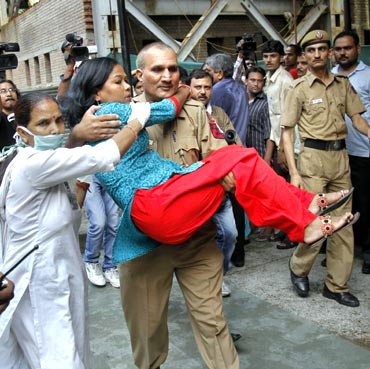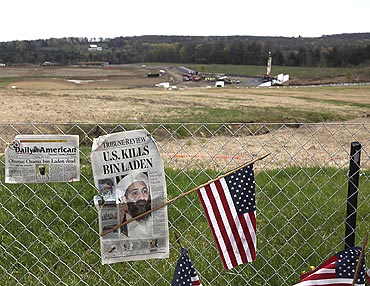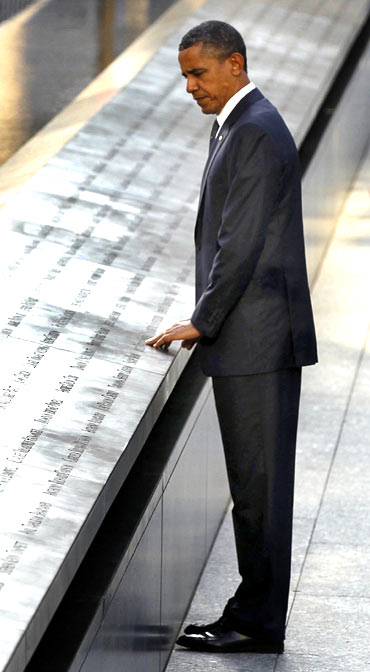
September 11, 2001, the day everything changed. This was the initial reaction to the attacks that revealed the real strength of Al Qaeda and the horror it could wreak on the world. Ten years on, the world is a different place, but did it change forever?
Clearly, the terror attacks jolted America, but it has come a long way since then. Al Qaeda chief Osama bin Laden was killed in May, leaving a void in the terror outfit. Bin Laden was an inspirational figure for jihadists, but it is too early in the day to say that his death ends the threat of terrorism to the world.
Over the years, the Lashkar-e-Tayiba poses a bigger threat than Al Qaeda, at least in the Indian subcontinent, says Stephen Tankel, author of a new book, Storming the World Stage: The Story of Lashkar-e-Taiba
In an interview with Rediff.com's Vicky Nanjappa, Tankel, a visiting scholar at the Carnegie Endowment for International Peace and assistant professor at American University, discusses the world of terror and its changing face.
Do you think America has won the war on terror?
The term 'war on terror' is flawed in a number of ways. One of them is that it conjures the image of a clear-cut victory or defeat, but this was never going to be the case.
The United States has had significant successes in some areas, such as degrading the central Al Qaeda organisation and preventing additional attacks against the homeland. But it has also suffered setbacks.
For example, its standing in the world has suffered as a result of various actions, in particular the invasion of Iraq. The threat still remains and it is one that the US will continue to confront. One barometer of success will be its ability to do so without shortchanging other pressing domestic and foreign policy priorities.

What does the rest of the world, especially India, need to learn from the US on curbing terrorism?
First, it is important to recognise that the nature of the terrorist threat facing India and the US is different.
9/11 punctured America's sense of security primarily, not only because of the extent of the destruction caused, but also because Americans had little experience with being attacked.
India has been forced to confront a drumbeat of attacks over the years, some executed by external groups and others by indigenous actors.
Further, in terms of the drivers of terrorism against India, regional factors and domestic grievances play a larger role. So, again, the nature of the threat is different.
That said, I do think one area where the US has had success that sometimes goes unheralded is in the important focus placed on international intelligence cooperation, training analysts and investigators, and increasing inter-agency coordination.
What people often see is the US military footprint overseas and the beefed up homeland security measures, but it's arguable that counter-terrorism improvements of the sort I just mentioned have played a major role in the ability to thwart attempted attacks and degrade enemy networks.

The US has done a good job of protecting the homeland, but that does not mean it is invulnerable to terrorism. I'd argue that no country is. That will remain the case even after Al Qaeda and all of its associated actors are gone.
Terrorist groups and networks can be eliminated, whereas terrorism is a tactic and one that future movements we may not be able to fathom today could employ.
That's not meant to be alarmist. It is simply to say that terrorism is not a new phenomenon and it is unlikely to disappear.
I'd reiterate that one of the keys to successfully responding to terrorism, regardless the perpetrator, remains taking a balanced approach that accounts for the need to respond to threats as they arise without shortchanging important domestic or foreign policy priorities.
Do you think Osama bin Laden's death has made the world a safer place to live in?
Bin Laden's death removed a very inspirational figure, sent the important message that the US retains the capacity to pursue its enemies wherever they may be and helped to sow a degree of disarray in Al Qaeda.
The intelligence recovered from his safe house might enable America to inflict even more damage than his death itself. But bin Laden's demise did not end the threat from jihadist violence to the US or other countries, especially India and Pakistan.

It's difficult to quantify and I tend not to try, especially considering I work off only open source material.
I'd say that among jihadist outfits, Al Qaeda Central, either acting unilaterally or in concert with another outfit like the Tehrik-e-Taliban Pakistan, still poses a threat. So does Al Qaeda in the Arabian peninsula, which some experts suggest has surpassed Al Qaeda Central.
Do you think the Lashkar-e-Tayiba is a far more dangerous outfit compared to Al Qaeda today?
It depends, far more dangerous to whom?
The LeT poses a bigger threat to India than Al Qaeda, but the latter remains a greater threat to the US at present.
The LeT also remains influenced more by regional dynamics than global jihad and its present situation in Pakistan can also act as a check against military adventurism vis-a-vis strikes against the US homeland.
That said, there is concern about the LeT in the US because of its transnational attack capabilities as well as the fear that it could spin out of control or that a faction in the group could leverage these capabilities for an attack unsanctioned by the LeT leadership.

All countries prioritise their national security interests before those of other countries, and the US is no different. But the US has intervened in conflicts where their interests were not directly threatened, most recently in Libya.
I'd also caution that there are limits to what America can accomplish.
It's a superpower, but that does not mean it is all powerful. Further, a world in which the US works to enable its allies to shoulder some of the burden, such as in Libya, would not necessarily be such a bad thing.